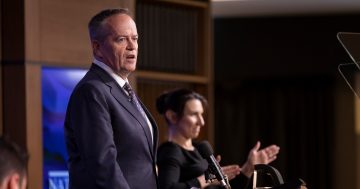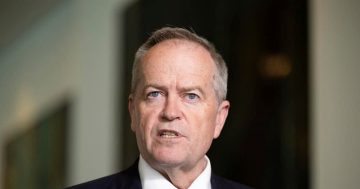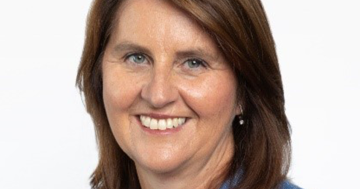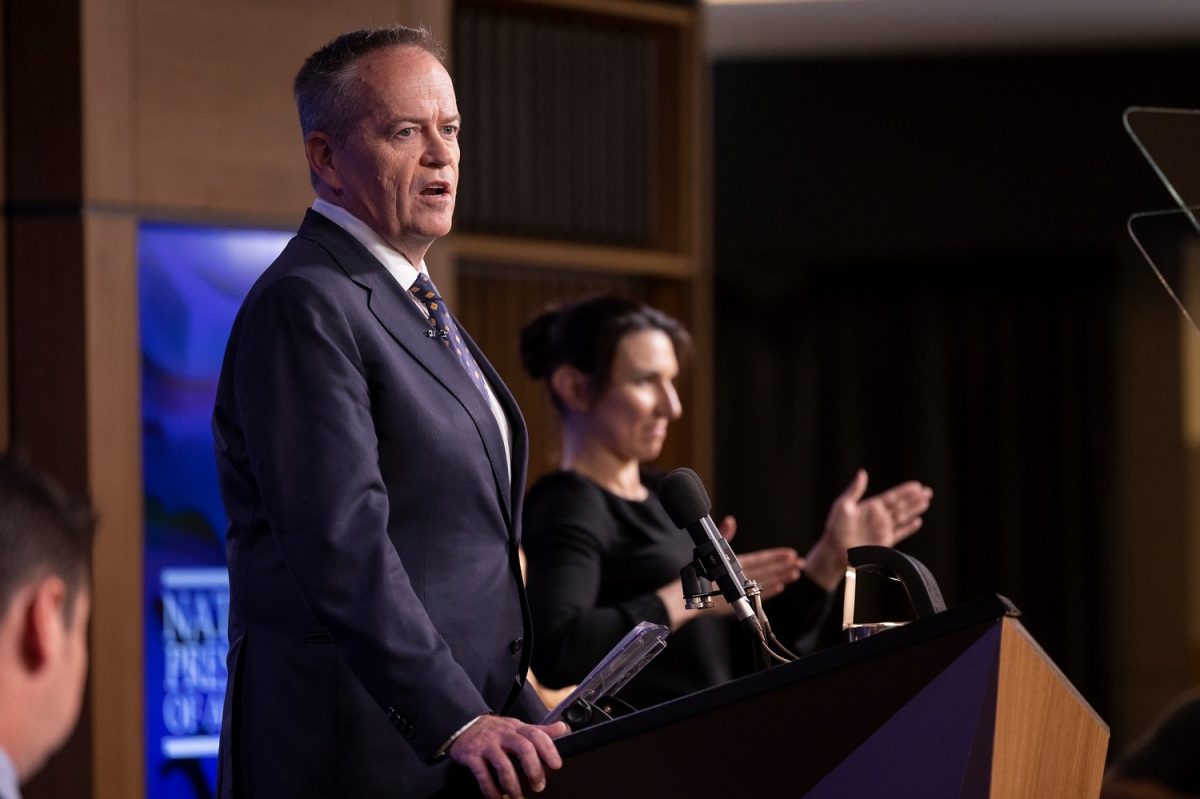
NDIS Minister Bill Shorten has proposed a list of major reforms to reboot the NDIS. Photo: National Press Club.
Government Services and National Disability Insurance Scheme Minister Bill Shorten has outlined a six-point plan of reforms he hopes will improve services, tackle fraud and unethical practices, and reboot the NDIS.
Speaking at the National Press Club in Canberra yesterday (18 April), Mr Shorten called for improvements to the experience of NDIS participants and undertook to look for ways to “reduce waste, inefficiency and inflationary costs” in the program.
Mr Shorten said he has had no greater privilege in his 15 years in politics than to listen to, learn from, and work with the people in the disability movement, saying he “stood on the shoulder of these fierce warriors, and the millions of Australians that they represent”.
Early in his speech, he looked down the barrel of the camera and stated that the NDIS is here to stay.
“It is not going away,” he said, adding later, “I want to be very clear; the scheme is going to go up. We’re going to spend more next year than we did this year and will spend more the year after, and so on.”
He said that at no point has he come under any pressure from the Treasurer or other members of government to slash the NDIS to subsidise other areas of the budget.
“I want to explain why we created the NDIS, explain how the NDIS lost its way, and explain why we need to reboot the scheme and disability services and supports – you could call this a sort of ‘State of the Union’ address on the NDIS.
“When Labor created the NDIS, we thought it would save people with disability … from the catastrophe that we could see coming,” he said, adding that the NDIS has changed the lives of hundreds of thousands of Australians with a disability and their families.
He said that the NDIS has not only changed those lives but that every state, territory and community benefitted socially and economically from the scheme.
“As NDIA reported last year, for every dollar invested in the NDIS, it’s delivering a $2.25 return to the economy. If only all government interventions or private businesses can boast this outcome.”
Mr Shorten said that the fact the scheme had survived the past nine years was “a credit to the dedication of people with disabilities, their families, their advocates, their allies, the service providers, unions, and the never-to-be underestimated decency of the Australian people”.
But he said that a “decade of mismanagement means it’s in trouble” and that, in particular, fraud and inefficiencies have led to a narrative where the cost of the scheme overrides the reality of return on investment. He said the NDIS is not what it should be, that it is not delivering the outcomes Australians with disabilities need and the Australian public expects. To reach its potential, he said, “it needs a reboot”.
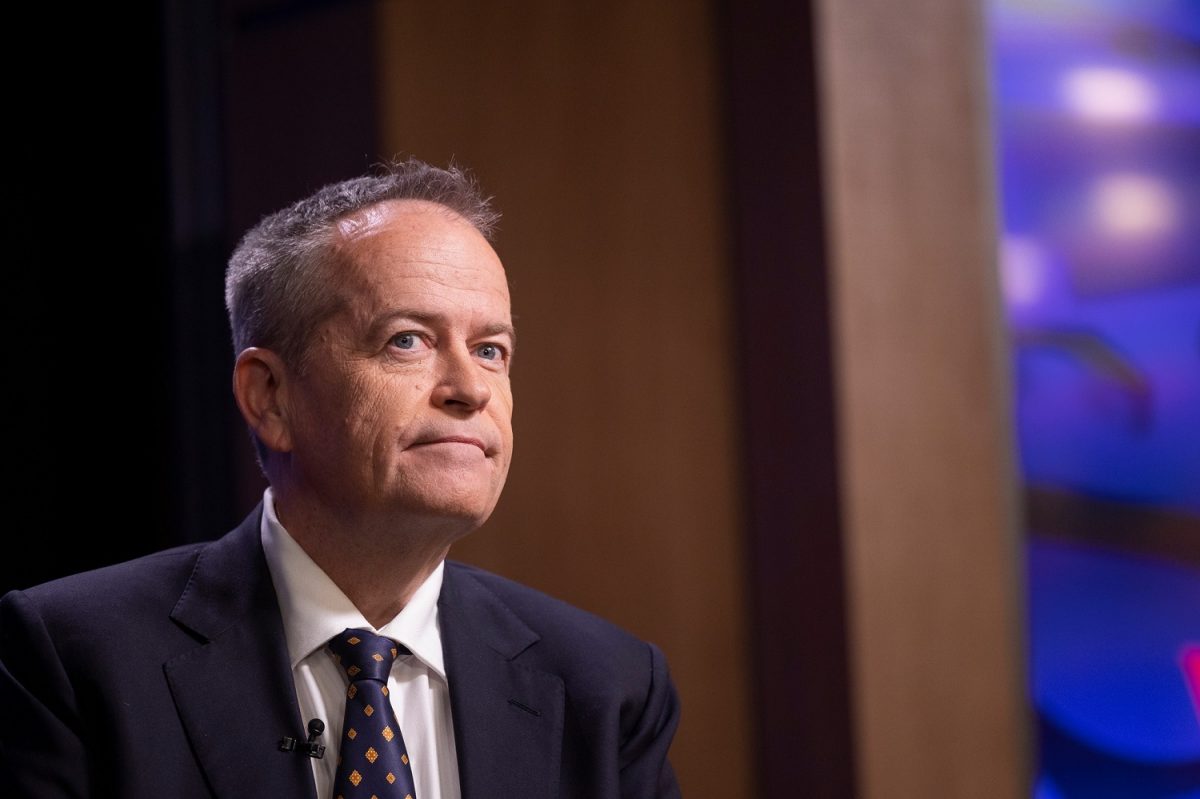
Mr Shorten said he has had no greater privilege in his 15 years in politics than to listen to, learn from, and work with the people in the disability movement. Photo: National Press Club
Mr Shorten outlined six systemic reforms he aims to implement.
“Our first systemic reform is to increase the NDIS workforce and specialisation,” he said, adding that the participant experience must be improved by focussing on the people they deal with in the agency and the people who support them in the community. He said that would mean lifting staffing caps, returning call centre functions in-house and getting the culture right.
The second reform will see the NDIS move to a longer planning cycle for participants.
“Short-term planning just isn’t working,” he said.
“It’s stressful, debilitating, frustrating and nonsensical that every 12 months or six months, participants and their families have to prove that they’re still disabled.”
The third systemic reform is the need to address what he described as “spiralling costs”. He said that while reasonable and necessary supports lie at the heart of the NDIS, these supports “must be reasonable and necessary”.
“I want to maximise the benefit of every NDIS dollar we spend. I’m talking about maximising the benefits for the participants, no one else.”
Mr Shorten’s fourth systemic reform is to review supported independent living, or SIL.
“Support Independent Living is designed to allow people with higher needs to live in their home, but with a significant amount of help 24/7 if necessary,” he said.
But he said the current SIL program is delivering “poor outcomes” for too many participants.
“In some cases, SIL splits up families or couples, and drives people into institutional settings that can in some cases be inappropriate.”
Targeting unethical practices and the misuse of NDIS funding is Mr Shorten’s fifth reform.
“With a renewed focus on evidence and data, we can get rid of shoddy therapies that offer little or no value to participants or desperate parents.”
The sixth systemic reform, and possibly the hardest one to deliver, will be the goal of surrounding the NDIS with an increased community of mainstream supports. He described these mainstream services as those that deliver on “inclusion and universal service provision, as they’ve always been meant to do”.
“I hear from many individuals and families that a form of unintentional division seems to have crept in, where if you have a disability, you take the NDIS line, and you don’t take the mainstream line. And once you are on NDIS, everything becomes an NDIS issue.
“Existing mainstream services and facilities like health, education, transport, they must be more accessible and supportive. We’re still having some of the same arguments we were having when I first became the parliamentary secretary – we need to foster inclusion and not segregation.”
He said it was time for the states and territories to “step up”, saying “state governments cannot have it both ways”.
“They can’t retreat from supporting people outside the scheme and, on the other hand, make a diminishing contribution to the NDIS. All levels of government need to honour their commitment to their citizens with disability, to provide them with high-quality, inclusive healthcare, education, housing, and transport – it’s a joint responsibility.
“I think the challenge for us is not just a state issue. The challenge is. How do we make sure that every dollar that the scheme has is getting to the people where it’s meant to go?”











